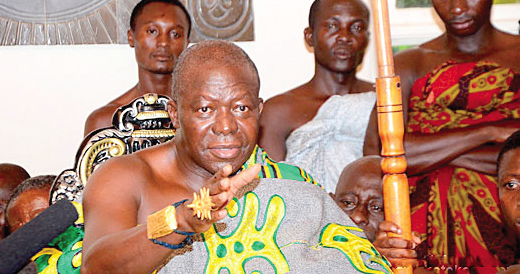The Asantehene, Otumfuo Osei Tutu II, has called for an amendment of the constitution to make chiefs signatories to mining concessions.
He said the current practice where the chiefs played no part in the granting of mining concessions on lands within their jurisdiction, “makes it impossible and difficult for the chiefs to monitor the activities of mining companies in their area.”
Again, he suggested that traditional councils be given equities in mine companies that operated within their areas to also benefit from the natural resources on their land.
According to him, if the chiefs owned equities in the mineral resources, they would be first to protect the resources and prevent the menace of illegal mining also known as ‘galamsey’.
He said that would also contribute to the development of the communities where those minerals were mined, as the traditional councils would have resources to develop the towns unlike the current practice where only royalties were paid to the traditional authorities.
Surface right
The Asantehene made the call during the last meeting of the Ashanti Regional House of Chiefs, where the house invited the Minister of Lands and Natural Resources, Mr Samuel Abu Jinapor, to brief them on the new Land Act, 20202 (Act 1036).
Otumfuo Osei Tutu observed that while the chiefs held the surface rights to the land, the constitution vested the mineral rights in the President.
However, he said the executive issued licences to concessionaires without recourse to the chiefs who owned the rights to the lands.
He said that had contributed to the wanton degradation of the nation’s natural resources and forest reserves, as the traditional authorities had no say.
Invitation
He said following the passage of the new land act, there was the need for the members of the house to be briefed on it and told the role expected of them, hence their invitation of a Justice of the Appeal Court as well as the sector minister to answer some nagging questions.
Commenting on the aspect of the law that mandated indigenes to sue their chiefs to compel them to account for their stewardship, the Asantehene asked his sub chiefs not to be perturbed as it would not happen in the Ashanti kingdom.
He said per the customs and traditions of the Asantes, only the traditional council could demand accountability from a chief and “there are ways of demanding that. No one aside from members of the traditional council can demand accountability from a chief.”
The Asantehene commended the sector minister for his good work since assuming office barely a year ago and urged him to continue with the good works to ensure sanity within the mining sector.
Laws
Addressing the house, Mr Jinapor said before the enactment of the new law, there were as many as 13 laws relating to lands which were scattered all around.
He said there was the need to bring all those laws under one umbrella and to also change some of the laws that were no more relevant to the present conditions in the country.
He said under the new law, chiefs could no longer sell land without the approval of the district assembly as the land use should fall within the plan of the assembly.
According to the minister, under the new law, anyone who engaged the services of land guards ran the risk of going to jail for a minimum of five years as the act had been criminalised.

